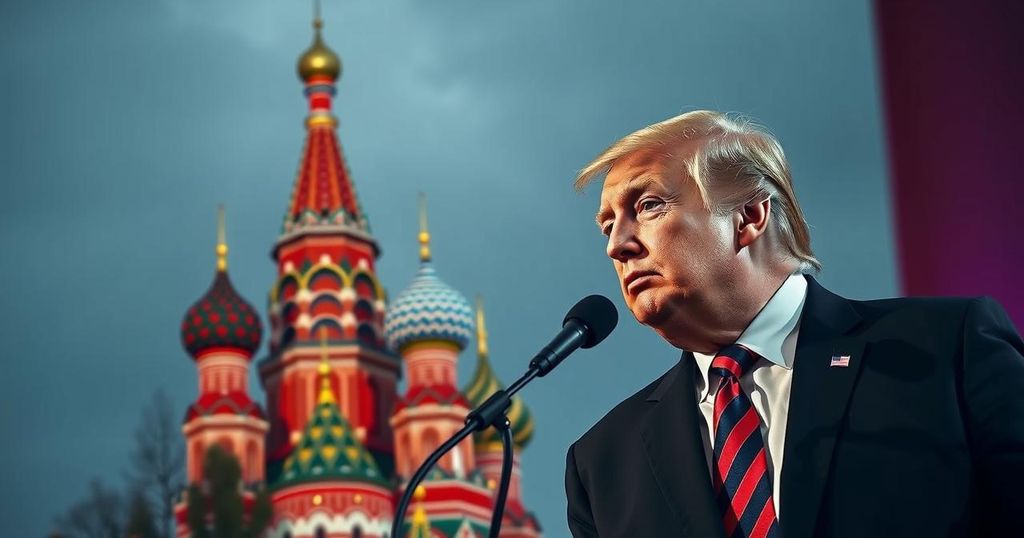Moscow’s Cautious Outlook on a Potential Second Term for Donald Trump
In anticipation of the U.S. presidential election, Russian officials reflect a cautious stance towards Donald Trump’s potential second term, contrasting sharply with the enthusiastic celebrations following his initial victory in 2016. Amidst prior disillusionment due to sanctions and ongoing geopolitical tensions, there is a recognition of the need for nuanced relations, particularly regarding the conflict in Ukraine.
In light of the upcoming United States presidential election, Moscow’s attitude towards a potential second term for Donald Trump is markedly more cautious than during his first election victory in 2016. During that time, Russian officials and supporters expressed exuberance, believing that Trump would foster improved U.S.-Russia relations and possibly lift sanctions. This enthusiasm was epitomized by Vladimir Zhirinovsky, who commemorated Trump’s win by purchasing 132 bottles of champagne and celebrating publicly. Simultaneously, Margarita Simonyan, the editor-in-chief of the state-funded news channel RT, even announced plans to drive around Moscow displaying an American flag. Initially, hopes surged that Trump would reverse the sanctions imposed on Russia and potentially recognize the annexation of Crimea. Konstantin Remchukov, editor-in-chief of Nezavisimaya Gazeta, noted that Trump was refreshing for Russian officials as he refrained from admonishing Russia on human rights issues. However, the optimism quickly dimmed as Trump imposed significant sanctions against Russia, leading to disappointment regarding his presidency. Eight years later, the Kremlin exhibits a more muted response to the possibility of Trump’s return. President Vladimir Putin’s comments supporting a Democratic candidate, albeit viewed as a jest, underscore this caution. While Putin humorously praised Kamala Harris’s laughter, he is likely more aligned with Trump’s rhetoric, which criticizes U.S. military support to Ukraine and displays a hesitant stance towards condemning Putin’s actions. In contrast, Harris has articulated that support for Ukraine is essential to U.S. interests and has categorically condemned Putin. Russian state media has not been kind to her, suggesting that her political capabilities would be better suited to a cooking show rather than governance. Furthermore, a tightly contested election in the United States may present advantages for the Kremlin, allowing a focus shift away from international affairs amid chaos. Historically, U.S.-Russia relations have soured under various administrations, with the deterioration accelerating under President Biden, especially following the Russian invasion of Ukraine. In interviews at a well-known site in Moscow, opinions varied regarding the U.S. Election. While some expressed animosity towards America, believing it to be a longstanding adversary, others, like Nikita, preferred Trump’s presidency, claiming it was a period devoid of significant wars. Furthermore, there is a sentiment that both nations should cultivate friendship rather than competition, with some Russians expressing a desire to see a woman in leadership positions, highlighting a potential shift in gender dynamics in politics. As the United States approaches its election on November 5th, global perspectives on its outcome, particularly concerning U.S.-Russian relations and the war in Ukraine, remain critical. Russians reflect a mixture of resentment towards the U.S. and a desire for better diplomatic ties, indicating complex attitudes towards American politics that may have enduring implications for international relations.
The article discusses the evolving perspective of the Russian government and populace regarding the potential reelection of Donald Trump as President of the United States. It highlights a contrast between the exuberant responses observed during Trump’s initial electoral victory in 2016 and the more reserved caution now exhibited by Russian officials and citizens ahead of the 2024 election. The background includes an analysis of past expectations surrounding Trump’s presidency, the resulting disillusionment due to sanctions, and current political sentiments influenced by ongoing conflicts, particularly the war in Ukraine and the geopolitical atmosphere.
In summary, while Russia initially celebrated Donald Trump’s victory in 2016 with high hopes for improved relations, the current atmosphere is one of cautious anticipation regarding his potential second term. The Kremlin acknowledges a more complicated landscape shaped by evolving U.S. foreign policy, domestic political dynamics, and the implications of international conflicts. Ultimately, public sentiment reflects a desire for peaceful coexistence, despite lingering historical animosities.
Original Source: www.bbc.com




Post Comment